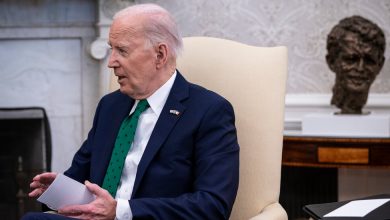FIFA Proposes Penalties for Russia but No Ban, Yet

Under mounting pressure to take action against Russia after its invasion of Ukraine, the leadership of world soccer’s governing body on Sunday agreed on a range of measures that would take effect for Russia’s crucial World Cup qualifying playoff next month. But the proposals — a ban on Russia’s name, flag and anthem and a neutral site for its games — do not include the all-out ban on Russia’s national team that its opponents are demanding, making it unclear if the punishments will resolve the confrontation, or if the games will be played at all.
Russia was drawn against Poland in March as part of a four-team group for one of Europe’s final places in the World Cup in Qatar later this year. If Russia were to win its game against Poland, it would meet Sweden or the Czech Republic for a place in Qatar when the tournament opens in November. Russia’s first playoff match and the potential second game had been scheduled to be played in Moscow.
The three other countries involved in the battle for the World Cup place — Poland, Sweden and the Czech Republic — have all refused to play Russia under any circumstances as a protest against Russia’s invasion of neighboring Ukraine.
Several top players, including Poland’s Robert Lewandowski, FIFA’s reigning world player of the year, have backed the decision to boycott any games involving Russia. Those statements, and similar ones by other players, have created intense pressure on FIFA to remove Russia from the competition.
Other soccer bodies have already taken action against Russia: European soccer’s governing body last week stripped St. Petersburg of this year’s Champions League final, and on Sunday England’s soccer federation said it would not play Russia in any international games for the foreseeable future “out of solidarity with Ukraine and to wholeheartedly condemn the atrocities being committed by the Russian leadership.”
On Sunday, a group of FIFA top leaders sought to find a way out of the crisis by agreeing to penalize Russia by ordering that its team be allowed to play but only in a neutral venue; without its flag or national anthem; and only if its team agrees to be known by a different name, according to three senior soccer officials with knowledge of the talks. The people declined to speak publicly ahead of an announcement, which could come as early as Sunday evening.
The measures mirror some of the penalties imposed against Russian teams by the International Olympic Committee after Russia was caught running a large, state-sponsored doping program; those punishments have been widely ridiculed as inadequate by athletes and Olympic officials from other countries.
They also may not be enough to persuade Russia’s rivals to agree to share a field with a Russian team, and put FIFA in the uncomfortable position of expelling three of its members while allowing Russia to advance unchallenged to the World Cup, soccer’s showcase event.
FIFA declined to comment on the proposed punishments against Russia, or the opposition of the three other federations who have vowed not to play. FIFA’s measures are only the first step in actions against the country’s soccer teams, said the senior soccer officials, and a harsher penalty — most likely an all-out ban on Russian teams from FIFA competitions — could be imposed if Russia’s attacks on Ukraine continue.
Russia’s soccer federation, meanwhile, rejected even the suggestion that it would not play the game, or games, as scheduled in Moscow. The federation, known as the R.F.U., said it would continue preparing for the games.
Understand Russia’s Attack on Ukraine
What is at the root of this invasion? Russia considers Ukraine within its natural sphere of influence, and it has grown unnerved at Ukraine’s closeness with the West and the prospect that the country might join NATO or the European Union. While Ukraine is part of neither, it receives financial and military aid from the United States and Europe.
Are these tensions just starting now? Antagonism between the two nations has been simmering since 2014, when the Russian military crossed into Ukrainian territory, after an uprising in Ukraine replaced their Russia-friendly president with a pro-Western government. Then, Russia annexed Crimea and inspired a separatist movement in the east. A cease-fire was negotiated in 2015, but fighting has continued.
How did this invasion unfold? After amassing a military presence near the Ukrainian border for months, on Feb. 21, President Vladimir V. Putin of Russia signed decrees recognizing two pro-Russian breakaway regions in eastern Ukraine. On Feb. 23, he declared the start of a “special military operation” in Ukraine. Several attacks on cities around the country have since unfolded.
What has Mr. Putin said about the attacks? Mr. Putin said he was acting after receiving a plea for assistance from the leaders of the Russian-backed separatist territories of Donetsk and Luhansk, citing the false accusation that Ukrainian forces had been carrying out ethnic cleansing there and arguing that the very idea of Ukrainian statehood was a fiction.
How has Ukraine responded? On Feb. 23, Ukraine declared a 30-day state of emergency as cyberattacks knocked out government institutions. Following the beginning of the attacks, Volodymyr Zelensky, Ukraine’s president, declared martial law. The foreign minister called the attacks “a full-scale invasion” and called on the world to “stop Putin.”
How has the rest of the world reacted? The United States, the European Union and others have condemned Russia’s aggression and begun issuing economic sanctions against Russia. Germany announced on Feb. 23 that it would halt certification of a gas pipeline linking it with Russia. China refused to call the attack an “invasion,” but did call for dialogue.
How could this affect the economy? Russia controls vast global resources — natural gas, oil, wheat, palladium and nickel in particular — so the conflict could have far-reaching consequences, prompting spikes in energy and food prices and spooking investors. Global banks are also bracing for the effects of sanctions.
“At the moment, the R.F.U. has not received any information from FIFA regarding the likelihood of postponing or canceling the World Cup qualifiers scheduled for March 24 and 29 in Moscow,” the Russian federation said. “We do not see any legal grounds for canceling the playoff game between the Russian and Polish national teams and the subsequent meeting with Sweden or the Czech Republic. The R.F.U. continues to prepare for these games.”
Russia, its top leaders and several wealthy individuals and companies have already been targeted by the West with heavy penalties that are having an immediate effect on life in the country, including a ban on air travel by Russian airlines to most parts of Europe. That prohibition would most likely make finding a venue for any game involving the Russian team difficult.
Russia is already widely considered a pariah in international sporting circles after a yearslong, state-backed doping program corrupted a series of international sporting events, including world championships and multiple editions of the Olympic Games.
If Russia’s team qualifies for the World Cup — and if it is allowed to play in the tournament — it will not be allowed to use its flag, play its anthem or be known by its regular name under an existing set of punishments issued two years ago by the global antidoping regulator. Those penalties do not cover qualification games.





